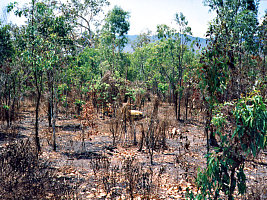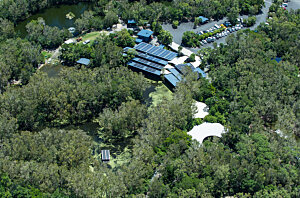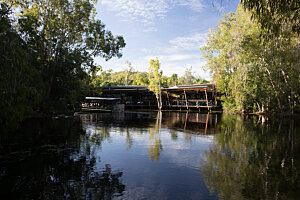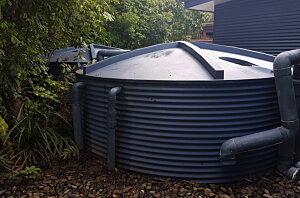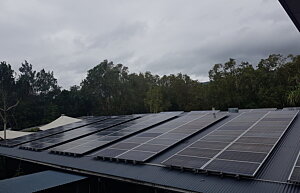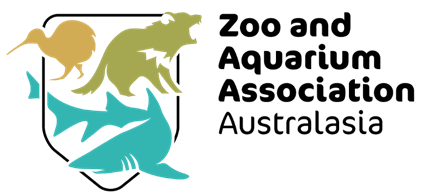Hartley's Crocodile Adventures Moving Forward Minimising Impact
Hartley's Crocodile Adventures is a long time accredited member of Ecotourism Australia and is the only wildlife park in Australia to be located with and surrounded by UNESCO World Heritage-listed forest.
The environmental significance of the location has not only shaped the aesthetically, sympathetic design of Hartley's Crocodile Adventures but places an onus on the business to operate in a sustainable way to minimise the impact on the surrounding landscape. The focus on energy and water conservation in the design of the buildings was formally recognised with Hartley's received the Harry Marks Award for sustainable architecture.
The site for Hartley's was once a farm. During the 1960s and 1970s, large sections of the site were cleared for the cultivation of crops and pasture for horses. A combination of low rainfall and poor clay soils made traditional farming difficult.
The farm fell into disrepair during the 1980s and became a commune for squatters. High bio-mass weeds infested the site, leading to 'hot' bush fires that scorched the riverine rainforest.
The rehabilitation of the land commenced five years before the attraction first opened in 2002. Over 7,000 native trees were planted to kick start the restoration of the site. Fire breaks were constructed to manage bush fires and decades of effort have been dedicated to weed eradication.
In many ways, Hartley's is a 'land-locked island' forcing it to find, store, manage and treat resources that modern society takes for granted, namely potable water, reliable electricity, sewerage connection, waste removal and digital connectivity.
- We are proud of our environmental record and we openly accept than we can always do more to reduce our footprint.
- Reducing waste in the restaurant has been challenging as we must satisfy the requirements of the Food Safety Act and the demands and expectations of our customers.
- For a few months, we have been researching alternatives to plastic packaging, either replacing the item with a non-plastic alternative or a biodegradable plastic. Those alternatives have now become commercially viable and are slowly becoming available through our suppliers.
- The restaurant has successfully implemented other initiatives including the reuse of waste oil from our deep fryers is to make biofuel and the recycling of cardboard from the packaging.
- Most of the electricity to run the restaurant comes from our 100-kilowatt solar array.
- Our recent focus has been devoted to the onsite plastic bottle recycling program. The recycling initiative initially failed as members of the public continued to contaminate the bin with general rubbish no matter how many signs and symbols we placed on the bins. The only successful way to minimise contamination was to make the restaurant staff responsible for separating the waste behind the scenes.
- The money from the plastic bottle recycling program supports the North Queensland Wildlife Trust which funds environmental projects helping local habitats and wildlife.
- Late last year, we banned plastic straws. Regrettably, our staff continue to receive abuse from customers not happy to use a paper straw.
- Our wildlife park attracts people from all walks of life, and some expect convenience over the environment and they can be quiet vocal to the dismay of our staff. The changes we make need to take staff welfare into consideration.
- We will continue to make improvements to our environmental footprint and over the coming months, we will reduce the amount of non-bio gradable plastic used in the restaurant.
- The world is an angry place and people too often use social media as a shield to display intolerance. Co-operation can achieve so much more than protesting.
- We do not discuss employment matters on social media.

